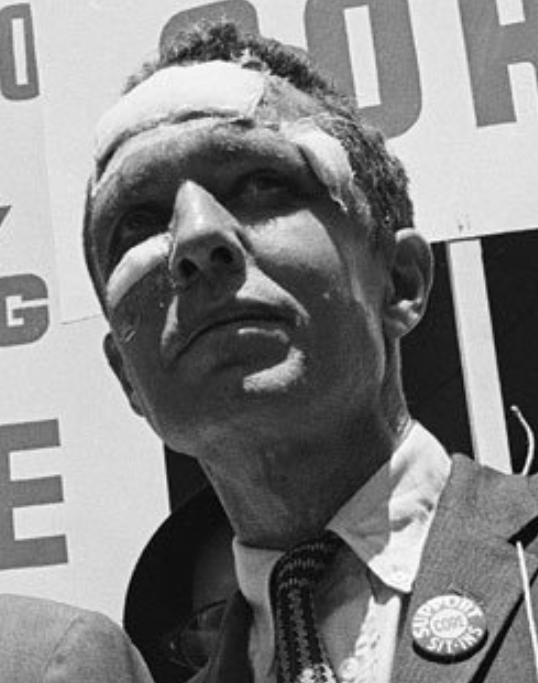By Lynn Burnett
Despite being born into a wealthy New York City family in 1914, James Peck was always something of an outsider. His Jewish family had converted to Christianity, but their conversion was never accepted: and as a young person, the already independently-minded James was never accepted either. This didn’t change when he entered Harvard in 1933… especially not after he brought a young Black woman to a school dance during his freshman year. For that action James was ostracized by both school and family, and his alienation from “the American establishment” became complete. He escaped by becoming a seaman for several years, where he joined striking ship workers, developed a lifelong commitment to unionization efforts, and experienced his first beatings and arrests. During the buildup to World War II, James Peck attended ant-Nazi rallies, and adopted a stance of radical antiwar pacifism and a commitment to nonviolent resistance. He was incarcerated for over two years during the war as a conscientious objector.
After James Peck was released, he joined anti-nuclear proliferation and other antiwar efforts, which he would continue for the rest of his life. He also joined the Congress of Racial Equality. CORE was dedicated to adapting Gandhian principles to the Black freedom struggle, and in the 1940s waged sit-in campaigns to desegregate the North. Amongst CORE’s leadership were luminaries such as James Farmer and Bayard Rustin, (who had also been imprisoned during the war for conscientious objection). James Peck was beaten during some of CORE’s northern sit-ins, including into unconsciousness by a police officer. He was arrested alongside Bayard Rustin during the 1947 Journey of Reconciliation, an integrated bus ride through the upper South that was a precursor to the Freedom Rides of 1961. Although these original freedom rides were far less violent than those of the 1960s, James Peck’s comrade Bayard Rustin was thrown on a chain gain doing hard labor. During the Montgomery bus boycott, Bayard emerged as Martin Luther King’s mentor, and James Peck, working as CORE’s publicist, worked to generate northern support for the bus boycott, writing: “By encouraging and supporting actions such as that in Montgomery, we who adhere to the principles of nonviolence hope to hasten complete abolition of segregation within our social system”.
James was the only member of the 1947 Journey of Reconciliation to also participate in the much more famous freedom rides of 1961. He was on the second of the two original buses. The first was firebombed, seriously injuring the passengers. The bus that James was on was attacked by Klansmen, who beat James unconscious and left him with gashes across his head that took 53 stitches to close. As John Lewis describes, he was “knocked down at my feet by twelve of the hoodlums, and his face was beaten and kicked until it was a bloody pulp.” After a hospital refused to treat him, James was taken to civil rights leader Fred Shuttlesworths’ home, where he stumbled out of the car looking “as bloody as a slaughtered hog”. Shuttlesworth was finally able to find a hospital willing to treat a White civil rights worker, where James underwent emergency treatment.
James Peck was soon released, and many of the freedom riders assumed their journey was over… or at the very least was over for James. However: “I said that for the most severely beaten rider to quit could be interpreted as meaning that violence had triumphed over nonviolence. It might convince the ultrasegregationists that by violence they could stop the freedom riders. My point was accepted.” James Peck reboarded the bus and continued the freedom ride. The moment turned James into a nationally recognized figure, a status he leveraged by travelling the country raising funds for the movement. James Peck continued his civil rights, antiwar, and labor organizing until a stroke in 1983 made organizing difficult.
Additional Resources
Book
James Peck: Freedom Ride: The Civil Rights Movement and Non-Violent Resistance.
Articles
Eyes on the Prize: Interview with James Peck. (Audio here.)
MLK Institute entry.
NYT obituary.
Spartacus Educational entry.
Wikipedia entry.
